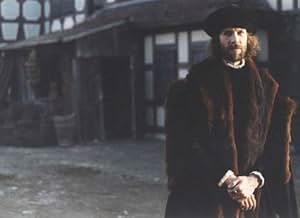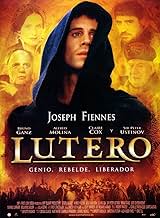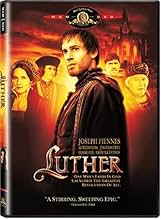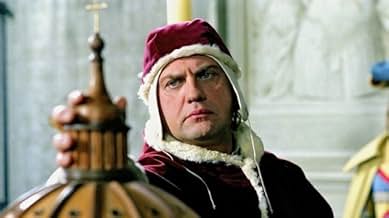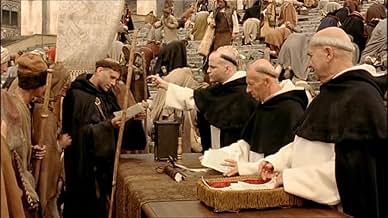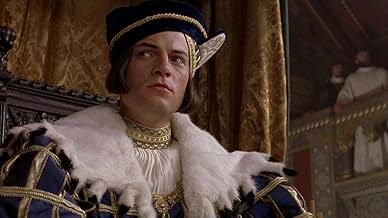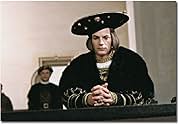Während des frühen 16. Jahrhunderts beginnt der idealistische deutsche Mönch Martin Luther, angewidert vom Materialismus der Kirche, seinen Disput, der schließlich zur Reformation führen wir... Alles lesenWährend des frühen 16. Jahrhunderts beginnt der idealistische deutsche Mönch Martin Luther, angewidert vom Materialismus der Kirche, seinen Disput, der schließlich zur Reformation führen wird.Während des frühen 16. Jahrhunderts beginnt der idealistische deutsche Mönch Martin Luther, angewidert vom Materialismus der Kirche, seinen Disput, der schließlich zur Reformation führen wird.
- Regie
- Drehbuch
- Hauptbesetzung
- Auszeichnungen
- 4 Gewinne & 1 Nominierung insgesamt
- Frederick the Wise
- (as Sir Peter Ustinov)
Empfohlene Bewertungen
What's troubling, then, about Luther is that the movie just isn't long enough to portray the story accurately, and therefore it feels not only unfinished but full of gaps. Things happen one against another, people come and go with little explanation, and yet the story marches on. Luther's mission is clear, but his purposes are so boiled down that only a few of his famous Theses are actually voiced in the movie. Shortening the story was obviously necessary for a movie, but in all, I think it acts against the dramatic effect of the film as a whole because things end up with a certain disjointed feel.
Still, the cinematography is brilliant and the acting nearly perfect. The film is worth seeing for its visual splendor (in both performance and sets) alone, and certainly as an introduction to a complex historical topic.
In the film appears famous historical characters who are well performed by a sensational plethora of British and German actors such as Ralph Fiennes (Shakespeare in love) , Bruno Ganz (Hitler in The Downfall) , Alfred Molina (Diego Rivera in Frida) and in his last film , Peter Ustinov (recently deceased , he was the immortal Nero in Quo Vadis) . The motion picture gets a colorful cinematography by Robert Frasse , as well as an atmospheric , evocative musical score by Richard Harvey and being well directed by Eric Till . Devotees of the history will love this movie which is a fine tribute to Martin Luther .
Director Eric Till presents Rome as a shattered city where depravity was everywhere This infuriated Luther who could not believe that Rome is a circus describing it as 'a running sewer, where you can bye anything, sex, and salvation, and where they also have brothels for clerics.'
He also witnesses the church collecting coins from the people supposedly to free their sins to build Saint Peter's Church and would be therefore released from Purgatory and enter the Heaven
Luther was eventually branded a heretic, his books examined and burned, and anyone who presumes to infringe Pope Leo's excommunication will stand under the wrath of Almighty God and the Apostles Peter and Paul
The reaction of the peasants in Germany was against the reaction of the Inquisition who was burning his writings For the German people "you can't burn his ideas." For the Church, his works shall be erased from the memory of man!
Luther's criticism was not against his Holiness, Pope Leo X, but of those rogues who claim to represent him His goal was not to quarrel with the Pope or the Church but to defend them than mere opinion! The Gospel, as he affirmed, cannot be denied for the word of man!
As a loyal son of the Church, Luther finds sanctuary with Prince Frederick, who finds him too daring for him but decides not to surrender him to Rome Luther goes on to produce his first translation of the New Testament Bible into German language He marries the ex-nun, Katerina Von Borg, becomes a hero to the people and in spite of his outlaw status with the Church authorities, his followers ultimately break with Rome
Joseph Fiennes played intensely the intriguing story of a brilliant Augustinian monk with an independent mind who is not interested in comfort but in the truth!
Sir Peter Ustinovin his final rolerealizes the danger Luther poses to the Catholic Church
Alfred Molina as Brother John Tetzel, is the showman terrorizing the good people of Jüterbog into purchasing special indulgences letting everyone know the fires of hell awaiting those who did not contribute
Johann Von Staupitz is the spiritual counselor who knows that Martin has aptitude for law, and could be send to Rome for a legal brief
Claire Cox is Luther's beautiful wife who stood behind her young 16th century monk driven by courage and outrage against a powerful Medieval Church
From a purely historical standpoint, the film offers a shocking glimpse into power and politics, as Cardinals attempt to bend and wrestle princes and monarchs to their side. It's a shame, but this film will probably not be recognized at the Oscars due to its strong religious tone. Therefore allow it to be said that the center core of actors all deserve Oscars for their performances, particularly Fiennes, Firth, and Ustinov. It was a pleasure to see Fiennes conform to an astonishingly strong, charismatic man who is not faultless, but instead human. The costuming, visual effects, and writing are all fantastic. The dialogue is unusually rich, spattered with direct quotes from Luther's literary works.
The best thing about "Luther" is the quality of the filmmaking. A lot of money was poured into this production, leaving Christian films like Megiddo and Left Behind in the dust. Not only will this receive greater recognition as a "serious" movie, it will also attract larger audiences due to the quality, budget, massive locations, and cast list. Secular audiences will get an open story of salvation. Christian audiences will have the pleasure of finally having a hero to root for in the cinema, a man who stands up for his faith against all odds.
Wusstest du schon
- WissenswertesThis was Peter Ustinov's final theatrical film before his death on March 28, 2004 at the age of 82.
- PatzerIn the movie Luther quotes the Bible by chapter, and verse. Versification of the Scriptures was not added until five years after Luther's death in 1546. The French scholar-printer Estienne introduced verse numbering and divisions in his Greek-Latin New Testament in 1551. In 1552 he printed a French-Latin New Testament, also with the verse divisions. And in 1553 he printed a French translation of the Bible with verse divisions throughout. Within the same decade the system of verse divisions spread widely, influenced by the adoption of this system in the Geneva Bibles.
- Zitate
Martin Luther: Unless I am convinced by Scripture and by plain reason and not by Popes and councils who have so often contradicted themselves, my conscience is captive to the word of God. To go against conscience is neither right nor safe. I cannot and I will not recant. Here I stand. I can do no other. God help me.
- VerbindungenVersion of Martin Luther (1953)
Top-Auswahl
- How long is Luther?Powered by Alexa
Details
- Erscheinungsdatum
- Herkunftsländer
- Sprachen
- Auch bekannt als
- Lutero
- Drehorte
- Coburg, Bavaria, Deutschland(Veste Coburg, castle)
- Produktionsfirmen
- Weitere beteiligte Unternehmen bei IMDbPro anzeigen
Box Office
- Budget
- 30.000.000 $ (geschätzt)
- Bruttoertrag in den USA und Kanada
- 5.791.328 $
- Eröffnungswochenende in den USA und in Kanada
- 908.446 $
- 28. Sept. 2003
- Weltweiter Bruttoertrag
- 29.632.684 $
- Laufzeit2 Stunden 3 Minuten
- Farbe
- Sound-Mix
- Seitenverhältnis
- 1.85 : 1
Zu dieser Seite beitragen



